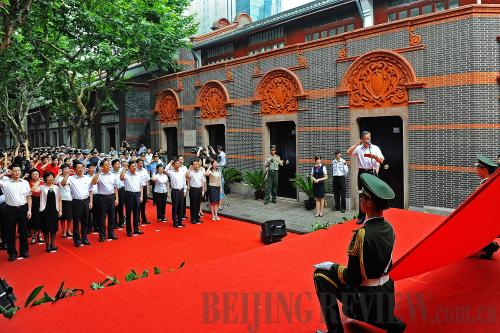|
 |
|
OATH TAKING: New Party members take their oath at the site of the First CPC National Congress in Shanghai on July 1 (XINHUA) |
Breakthroughs
In his speech, Hu summarized the CPC's achievements in the past nine decades as "three earthshaking events"—breakthroughs that enabled the Chinese people to bid farewell to national humiliation since the Opium War and led to profound social transitions in the country, said Gao Xinmin, a professor with the Party School of the CPC Central Committee.
First, the CPC "completed the new democratic revolution, winning national independence and liberation of the people," Hu said. The CPC-led new democratic revolution culminated in the founding of the People's Republic of China in 1949, after 28 years of fighting, including wars against Japanese aggressors and the Kuomintang regime.
Second, shortly after the founding of the People's Republic, the CPC "completed the socialist revolution and established the basic socialist system," Hu said. This was done largely by changing private ownership in different sectors of the economy into public ownership.
Third, the CPC "carried out a great new revolution of reform and opening up, creating, upholding and developing socialism with Chinese characteristics," Hu said. The reform and opening-up program was initiated in the late 1970s to boost China's modernization drive by unleashing market forces and open the country to the rest of the world.
China's economic miracle in recent decades is widely acknowledged. The country's GDP skyrocketed from 364.5 billion yuan ($56.35 billion at current exchange rates) in 1978 to 39.8 trillion yuan ($6.15 trillion) in 2010, its total imports and exports soared from $20.6 billion in 1978 to $2.97 trillion in 2010, and products made in China can now be found almost everywhere, from stylish stores in New York to bustling bazaars in Islamabad.
Even by UN standards, China's rise has been meteoric. It has fulfilled several of the UN's Millennium Development Goals (MDGs) ahead of schedule. China is the first developing country to achieve the MDG poverty reduction target of halving the proportion of people whose income is less than $1 a day between 1990 and 2015. It also met the MDG target of universal primary education in advance, as the net primary school enrollment rate in China had reached 99.4 percent by the end of 2009.
These achievements explained why the CPC has remained in power, said Huang Weiding, a scholar on CPC studies and former associate editor in chief of the Red Flag Press. The Party has been able to do so because it won people's support while leading them in establishing the People's Republic of China, he said. Moreover, since it came to power in 1949, it has continued to keep up with the times and has always represented the people's fundamental interests.
Over the past nine decades, the CPC has attached great importance to theoretical innovation, said Xin Xiangyang, a CASS research fellow. Before Marxism was introduced to China, the Chinese people did not have an advanced theoretical system to look at the outside world, he said.
As the CPC applies Marxism in the country in an innovative way, the Chinese have gained a clearer understanding of the development of China and the world at large, Xin said. With this understanding, the Party has formulated and implemented policies for the people's benefit.
The CPC has made two major theoretical achievements by adapting Marxism to China's conditions, Hu said. One is the Mao Zedong Thought—strategies and principles on the CPC-led new democratic revolution as well as socialist revolution and construction.
The other theoretical achievement is the "system of theories of socialism with Chinese characteristics." This system includes the Deng Xiaoping Theory, the important thought of the Three Represents and the Scientific Outlook on Development. These theories have been developed since China adopted the reform and opening-up policy in the late 1970s.
For instance, the Scientific Outlook on Development, advocated by President Hu, calls for comprehensive, balanced and sustainable development. The CPC put forward this concept to address problems in the wake of China's explosive growth in recent decades, such as resources depletion, environmental degradation and a widening wealth gap.
As part of its efforts to promote development in a more sustainable way, the CPC has called on local governments to focus on environmental protection and further improvements in residents' living standards, rather than seeking growth at all costs. It has also seen to it that China's social safety net, including medical insurance, unemployment insurance and old-age pensions, continues to expand and improve.
| 